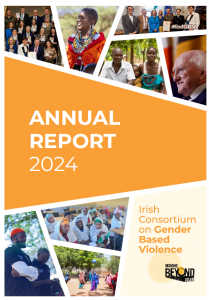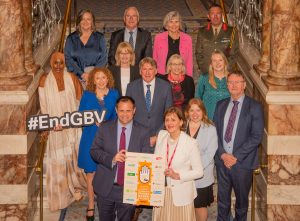Video produced in commemoration of 20 years of the ICGBV.
All posts by Róisín Gallagher
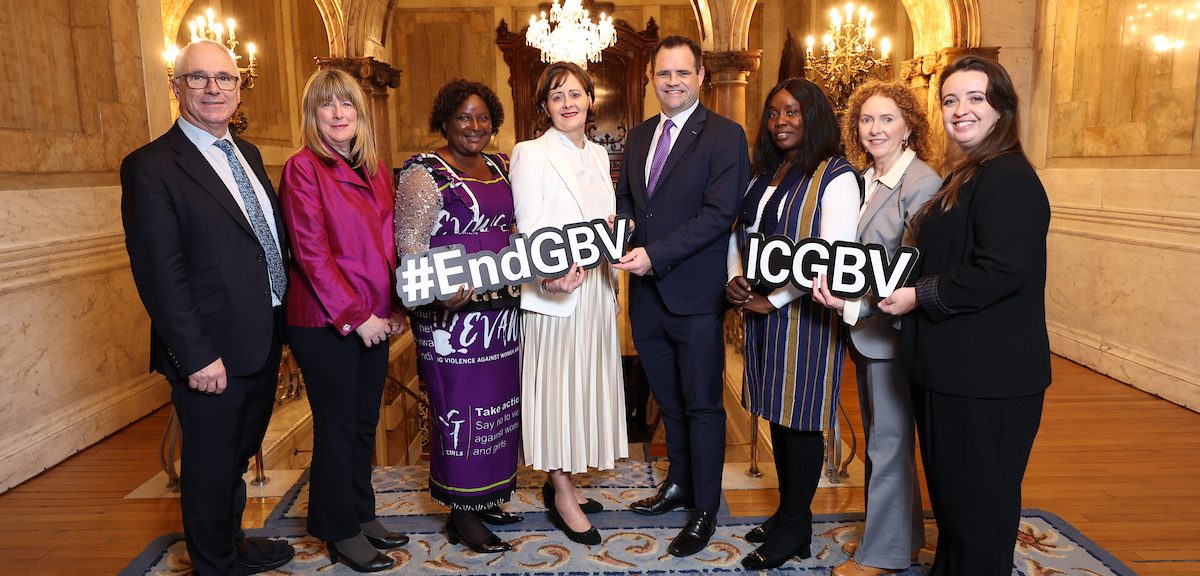
ICGBV marks 20 Years of tackling Gender-Based Violence, amid rising conflict and decreasing support for women-led organisations across the world
Dublin, 09 December 2025 – The Irish Consortium on Gender-Based Violence (ICGBV) commemorated its 20th anniversary at Iveagh House, in partnership with the Department of Foreign Affairs. The event brought together government leaders, civil society, grassroots advocates, academia, corporates and humanitarian actors to reflect on two decades of collaboration—and to confront the urgent challenges ahead as violence against women escalates worldwide and support for women-led organisations declines.
The Reality in 2025:
- Nearly 1 in 3 women globally—an estimated 840 million people—have experienced sexual or partner violence in their lifetime.
- 676 million women now live within 50km of deadly conflict—the highest level in 30 years.
- Conflict-related sexual violence has surged 87% in just two years.
- Every day, 140 women and girls are killed by an intimate partner or family member.
- Despite record military spending, only 0.4% of aid reaches women’s organisations in conflict settings, many on the brink of closure.
Women-led organisations report that GBV response programmes have been hardest hit by funding cuts—67% of services reduced or closed.
This commemoration coincided with the 30th anniversary of the Beijing Platform for Action and the 25th anniversary of UN Security Council Resolution 1325, reinforcing Ireland’s commitment to the Women, Peace and Security agenda. Ireland’s newly launched National Action Plan on WPS signals continued leadership in gender equality and peacebuilding.
Speaking ahead of the event, Minister of State for International Development and Diaspora, Neale Richmond, said:
“At a time when many governments are retreating, Ireland is resolute. Tackling gender-based violence is a matter of justice, security, and human dignity. When women and girls are safe, societies are stronger, economies thrive, and peace endures.”
Michael Gaffey, Director General of Irish Aid, added:
“This is why gender equality and ending GBV remain at the heart of Ireland’s international development policy. Our commitment is unwavering because the cost of inaction is measured in lives lost and futures stolen.”
The anniversary event featured a diverse range of speakers including:
- Alice Kachere, Gender Based Violence Community Advocate, Malawi
- Susan Mani, Rainbo Initiative, Sierra Leone
- Michael Gaffey, DG Irish Aid
- Professor Fionnuala Ní Aoláin, human rights law expert
Other notable contributions to the event included video insights from: Dr. Isata Bendu Mahoi, Minister of Gender and Children’s Affairs, Sierra Leone, Professor Nata Duvvury, Director, Centre for Global Women’s Studies, University of Galway and Jayne Lawlor, Senior Diversity, Equity and Inclusion Officer, Irish Defence Forces
Chair of ICGBV, Siobhán Walsh, underscored the urgency
“Gender-based violence does not pause during crises or funding shortages—it intensifies when support systems collapse. The progress of the past 20 years has been hard-won because of the power of partnership. This Consortium is unique—bringing together government, the Defence Forces, and civil society to work side by side for a common purpose. To all of you—our member NGOs, sister consortia, the Irish Government, and the Defence Forces—thank you for your steadfast commitment. Now, more than ever, we must stay the course and double down on our efforts. We owe this to courageous change-makers on the front lines—those restoring dignity, changing futures, and keeping hope alive. Hope is not passive; it is a deliberate choice to keep building on these gains and to act together for a safer, more equal, and more just world for everyone.
Note to Editor:
The Irish Consortium on Gender-Based Violence (ICGBV) is a unique Irish-based alliance of international humanitarian, development, and human rights organisations, working alongside Irish Aid and the Irish Defence Forces. Established in 2005 in response to reports of systematic sexual violence in Darfur, Sudan, the Consortium promotes knowledge-sharing, strengthens policy and programming on GBV in humanitarian and development contexts, and builds leadership toward a shared vision: a world free from gender-based violence.
For more information visit: ICGBV | Moving Beyond Fear
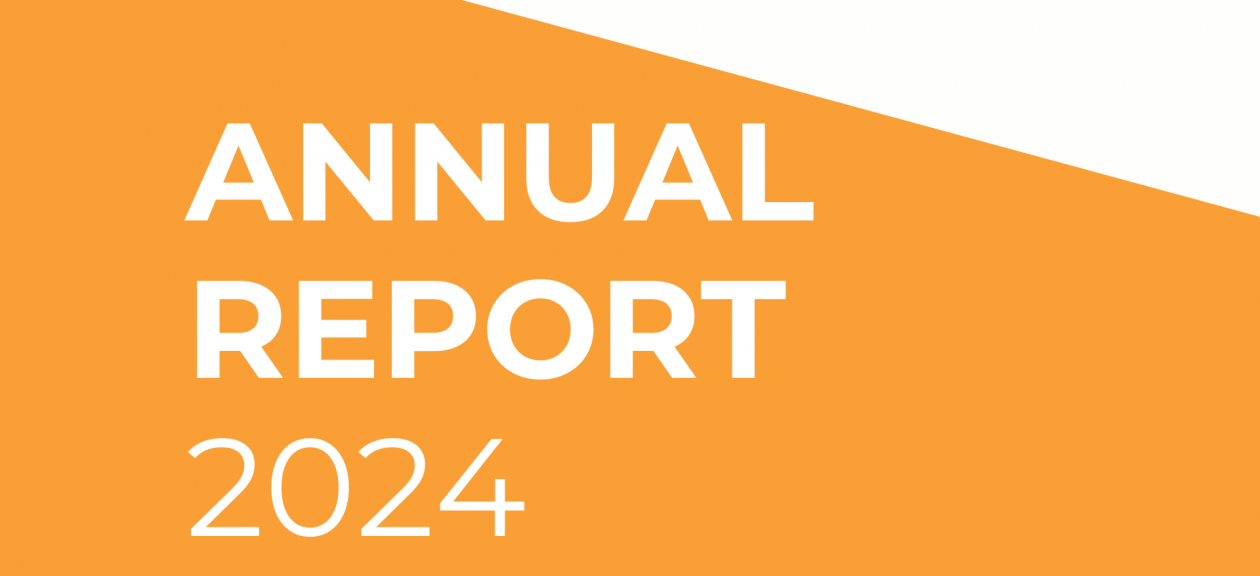
Annual Report 2024
The ICGBV has published its 2024 Annual Report.
In 2024, our members continued to demonstrate leadership and deep commitment to a world free from Gender-Based Violence (GBV). Highlights include the launch of two research publications, Tracking the Money Towards Ending GBV and From Survivor-Centred to Survivor-Led, as well as growing international engagement at CSW68, in the WPS agenda and through our global 16 Days campaign.
The report documents Consortium progress across our strategic pillars of Prevention, Mitigation, and Response, and features snapshots of members’ work and achievements of our International Consortia in Sierra Leone and Malawi.
Read the full report here. A printer-friendly version is available here.
Video – 2024 Highlights
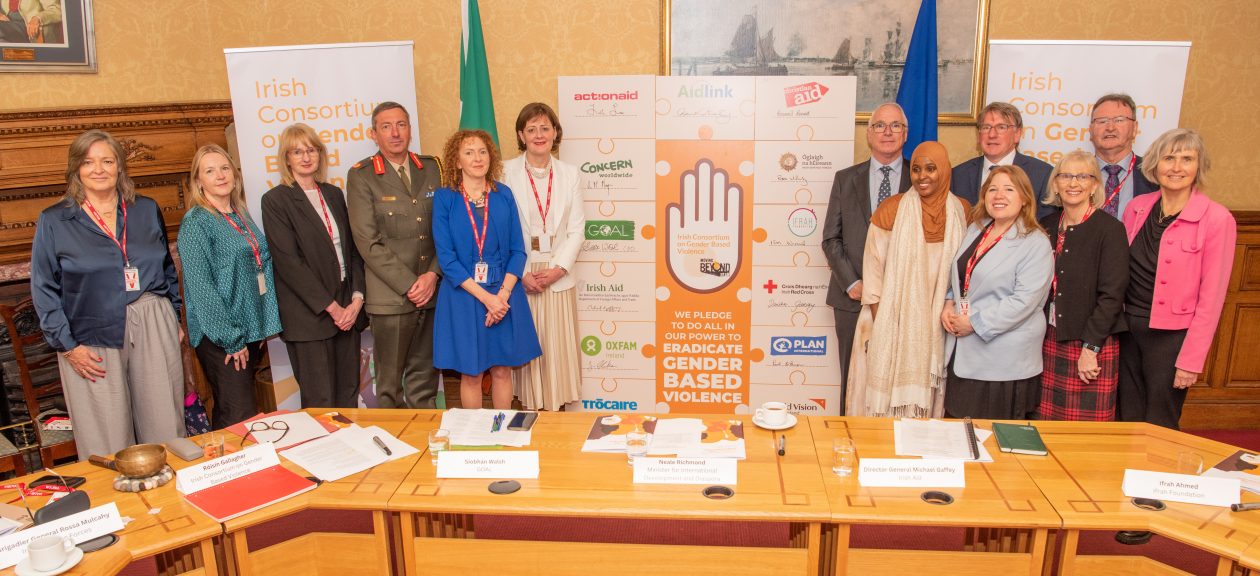
Irish Leaders Unite to Reaffirm Global Commitment to Ending Gender-Based Violence
(Dublin, 16/04/2025) – Senior leaders from Ireland’s international development, humanitarian and defence sectors came together today at the Department of Foreign Affairs for the Annual CEO Roundtable of the Irish Consortium on Gender-Based Violence (ICGBV). The event, attended by Minister of State for International Development and Diaspora Neale Richmond, saw the 13-member Consortium renew their collective pledge to end gender-based violence (GBV).
This marked Minister Richmond’s first address to the Consortium, following his recent return from visits to Irish Aid-supported programmes in Sierra Leone and Liberia—including a programme delivered by GOAL, the current Chair of the ICGBV. His presence underscored a timely and renewed government commitment to tackling GBV both at home and abroad.
The ICGBV Roundtable comes at a critical moment in the global fight against GBV. Yesterday marked the second anniversary of the most recent conflict in Sudan, where, once again, GBV is being used as a weapon of war, with 12 million women and girls and increasing numbers of men and boys at risk. Conflict, displacement, climate change and a tightening global funding landscape continue to exacerbate risks globally, particularly for women and girls.
At today’s gathering, each member organisation voiced new and renewed commitments for the year ahead—centred on scaling up prevention, improving access to justice and protection, and promoting survivor-led accountability across all levels of programming and advocacy.
Siobhán Walsh, CEO of GOAL and Chair of the ICGBV, underlined the importance of coordinated leadership:
“Today’s roundtable reflects the depth of commitment across Irish civil society and government, to galvanize our work and double down on our commitment to tackle this growing gender-based violence crisis. This means the creation of even stronger systems of support and accountability with the meaningful inclusion of survivors and sharing our learnings at a global scale. But we can’t drive forward on this collective ambition without increased and sustained funding. We must double down on this ambition to make meaningful progress.”
Róisín Gallagher, ICGBV Coordinator, also addressed the gathering, following her recent return from New York, where she represented the Consortium at the UN Commission on the Status of Women (CSW69). There, ICGBV co-hosted a high-level event with the governments of Ireland, Sierra Leone and the National Women’s Council of Ireland, reaffirming the relevance of the Beijing Platform for Action and spotlighting the leadership of survivors in driving systemic change.
“Our collective challenge now is to translate policy promises into lived change. Survivor-led accountability means shifting power beyond consultation – so that those most affected by GBV lead the response to it. This will create true progress.”
Neale Richmond, Minister of State with responsibility for International Development and Diaspora
“It is a privilege to address the Irish Consortium on Gender Based Violence. The Department of Foreign Affairs and Trade is very proud to be part of this unique collaboration that brings together both government and civil society, united by our shared vision of a world free from gender-based violence.
Gender equality and the empowerment of women and girls is a cornerstone of Ireland’s foreign policy. Within this, the elimination of gender-based violence is both a domestic and foreign policy priority for Ireland. We recognise that it is fundamental to achieving gender equality and a necessary precondition to the achievement of the Sustainable Development Agenda and a more peaceful and sustainable world.”
Leaders and CEOs from the Irish Consortium on Gender-Based Violence gathered at Iveagh House on April 16th with Minister Neale Richmond and Irish Aid Director General Michael Gaffey to reaffirm their commitment to ending gender-based violence.
CSW69 Side Event Recording: GBV Survivors Leading the Way to Change
March 20th, 2025 | Permanent Mission of Ireland to the UN, New York & Online
The ICGBV, the Permanent Mission of Ireland to the UN, the Government of Sierra Leone and the National Women’s Council of Ireland co-hosted a CSW69 side event exploring the role of the survivor in GBV initiatives. The event brought together survivor leaders, policymakers, practitioners and advocates to explore how survivors can drive justice, policy reform, and systemic change.
Speakers underscored the crucial role of survivor leadership in shaping effective GBV responses. Ambassador Fergal Mythen reaffirmed Ireland’s commitment to tackling GBV in his opening remarks and emphasized that survivor voices must be central to accountability efforts. Katrien Coppens gave the keynote speech, highlighting the far-reaching effects of trauma, the importance of breaking the silence, and how linking survivors through networks has strengthened advocacy efforts. Ivanna Youtchak emphasised the ethical and cost-effective approach of ensuring the meaningful engagement of survivors from the outset. Róisín Gallagher, recommended survivor leadership as key to increasing GBV accountability and called for greater funding to end GBV.
During the 50-minute panel discussion, panellists Tinebeb Berhane (ActionAid, Ethiopia), Ruth Quinn (Global Survivors Fund), and Iryna Dovgan (SEMA Ukraine) answered questions from the moderator on accountability and the expert status of survivors. Alisa Kovalenko (SEMA Ukraine) showed a trailer for her upcoming documentary on CRSV in Ukraine. Key themes during the discussion included:
- The Crucial Role of Survivor Leadership
- Breaking the Silence & Strengthening Survivor Networks
- Survivors at the Heart and Start (of all systems and services)
- Avoiding Stigmatization & Preserving Dignity
- The Transformational Power of Survivor-Led Reparations
- Raising Awareness to Reach More Survivors
- Funding to End GBV: Challenges and Opportunities
- Recognizing Survivors as Experts & Changing Social Norms
Minister of Gender and Children’s Affairs, Sierra Leone, Isata Mahoi, reflected on the suffering of SGBV survivors from the civil war in SL, who were not catered for during reparations. She closed the session by commending the research presented, which she said would go a long way in enhancing quality of care for survivors, encouraging us to transition to survivor-led accountability
Throughout the session, speakers and panellists reinforced that GBV remains critically underfunded and that flexible, sustainable financing is essential to support survivor-led initiatives, long-term recovery, and systemic change. The conversation reinforced that survivors must not only be included in decision-making but lead efforts for accountability and change.
Watch a recording of the event here.
Survivors of Sexual Violence Must have Agency In pursuit of Justice and Healing
Survivors are more than victims. They are leaders with lived experience to create real change. It is time to let their voices lead us to solutions.
GBV violates fundamental human rights and is a major barrier to achieving gender equality. Women, girls, and people with diverse sexual orientations and gender identities are most at risk, and the statistics are staggering. Every 10 minutes, a woman is killed simply because she is a woman. That’s the brutal reality of the world we live in.
The UN has identified violence against women as one of the most severe human rights violations globally. In humanitarian crises, the problem worsens—70 per cent of women in crisis settings experience GBV, compared to 35 per cent worldwide. The evidence is all around us, reflected in the heartbreaking reports of violence from crises unfolding across our screens daily.
Sexual violence is used systematically as a weapon in conflicts all over the world, devastating men, women, children, and LGBTQI+ communities. The impact is compounded by the destruction of critical GBV services and the loss of skilled staff during times of conflict. In Sudan, the need for GBV-related services has skyrocketed – increasing by 100 per cent to 6.7 million people as of December 2023. Internally displaced women and girls face the highest risk, enduring conflict-related sexual violence, sexual exploitation, and abuse.
20 years on from the establishment of the ICGBV in response to the extreme levels of sexual violence faced by women and girls in Darfur, Sudan, it may seem as though little has changed. Yet, there has been progress in shifting GBV policies and practices to recognise survivors as the architects of their own recovery.
The ICGBV’s new report titled “From Survivor-Centred to Survivor-Led: Lessons from Promising Survivor-Led Gender-Based Violence Accountability Initiatives,” highlights valuable lessons from survivor-led efforts in GBV prevention, mitigation, and response.
Welcoming the report, President Michael D. Higgins, ICGBV Patron, advised:
‘This report gives voice to those who have too often been silenced, voices that can make a difference, voices of those who have not only survived violence but have found the strength to lead in the pursuit of justice and healing.’
Survivor-led accountability requires, first and foremost, that the survivor’s dignity is upheld and that they have the resources and skills to lead the process of justice and recovery – if they choose to do so.
Empowering survivors at every stage is critical, especially considering the profound loss of agency they experience during acts of violence. Research suggests that even well-intentioned survivor-centred approaches can unintentionally de-centre survivors, reinforcing paternalistic systems within humanitarian protection.
True survivor-led approaches shift power dynamics, recognising survivors as the best decision-makers and experts based on their own lived experiences.
President Michael D. Higgins also advises:
‘The transition from survivor-centred approaches to survivor-led action seeks a profound shift in policy and practice — one that places survivors’ agency at the heart of justice efforts. It is a powerful, enduring call for justice, dignity and action, highlighting that those who have endured the deepest wounds must be central to building solutions, shaping policies, and ensuring accountability.’
The ICGBV research emphasises the shift from ‘survivor-centred’ to ‘survivor-led’ accountability, where survivors take the lead as decision-makers and agents of change. Survivor-led approaches build on the foundation of survivor-centred work, providing clearer concepts and unlocking greater potential for transformative impact.
Empowered survivors can advocate for themselves and others, creating a ripple effect that strengthens community resilience and advocacy efforts, influences policy, and ultimately leads to long-term, sustainable, and systemic change.
Collective healing emerged as a key theme in the findings, highlighting the power of peer support in survivor-led approaches to GBV and the transformative potential of movement building —where communities unite to drive change and help survivors overcome barriers to leadership. ‘What might begin as a collective psychosocial healing process can ultimately become a political process’ or ‘therapeutic activism’ – when an act of healing grows into broader reform. Survivor-led approaches also strengthen accountability mechanisms, making services more responsive to survivors’ needs and driving better outcomes, including increased funding opportunities.
However, supporting survivor-led approaches requires dedicated resources. Survivors need access to funding to run their initiatives, including fair compensation for their expertise and time. Advocacy for systemic change is resource-intensive and often takes years. Despite the significant economic cost of GBV—more than double the expenditure on education in many countries—and its long-term impact on future generations, funding for GBV remains critically low, accounting for just 0.69% of total humanitarian aid and less than 1% of Official Development Assistance (ODA).
Flexible, unrestricted, multi-year funding is crucial to support the comprehensive work needed to change the norms, attitudes, and behaviours that drive GBV. Governments, policymakers, practitioners, donors, and researchers must actively provide funding, offer in-kind support, and supply the technical and organisational resources necessary to ensure survivors can access holistic care. It is also essential that they prioritise fair and equal involvement with survivor-led GBV accountability initiatives that are in line with their responsibilities.
As we approach the 30th anniversary of the Beijing Declaration and Platform for Action, which is considered one of the most progressive blueprints for advancing women’s rights globally, many believe it would not be possible in today’s environment. It is, therefore, timely that we mitigate against the current challenges that affect its implementation and the achievement of gender equality more broadly. Eliminating violence against women is paramount to this agenda, and the only right path to achieve it is by following the courageous lead of survivors.
Mary Van Lieshout – Co-Chair, ICGBV and Deputy CEO and Director, External Relations, GOAL
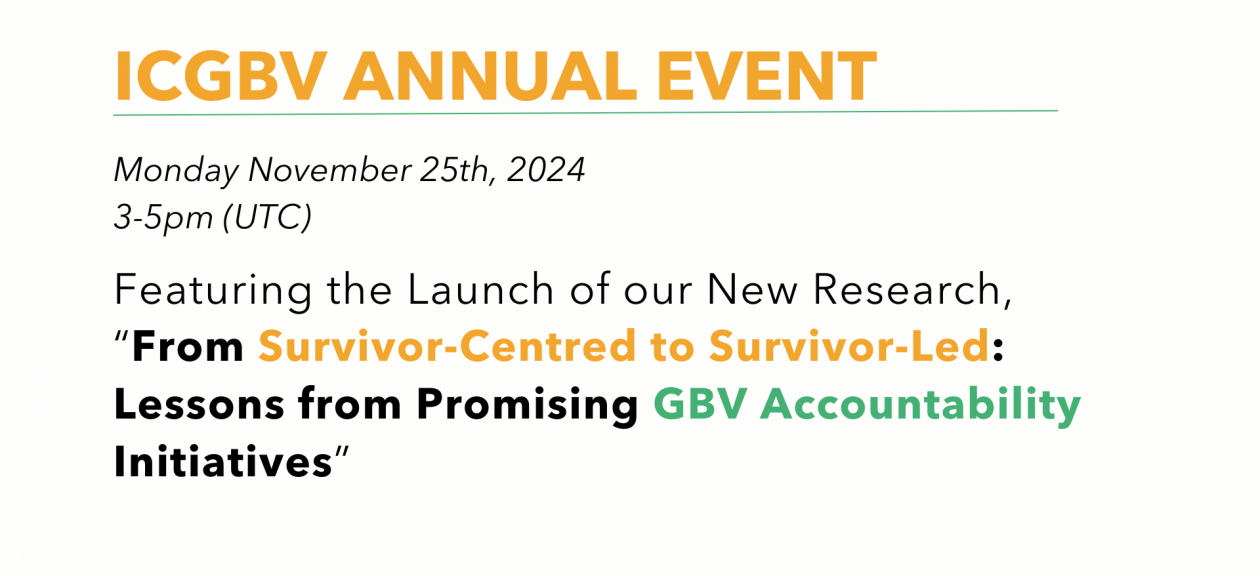
16Days Webinar Recording: “From Survivor-Centred to Survivor-Led” Research Launch
This webinar features the launch of our new, ground-breaking research, “From Survivor-Centred to Survivor-Led: Lessons from Survivor-Led Gender-Based Violence Accountability Initiatives”.
During the webinar, researcher Brenda K. Kombo JD, PhD, presents the research findings, showcasing evidence of established and emerging good practice to inspire a shift within policy and practice from survivor-centred to survivor-led approaches. With a global focus across humanitarian, development, and peace support contexts, the initiatives seek to prevent, mitigate and respond to GBV. Recommendations to states, policy makers, practitioners, donors and researchers are made, in order to promote survivor-leadership.
The webinar also features:
- Opening remarks from Siobhán Walsh, Chair of the ICGBV and CEO of GOAL Global
- A message from the Patron of the ICGBV and President of Ireland, Michael D. Higgins
- A panel discussion moderated by Namukabo Werungah, Staff Reporter and Editor at The New Humanitarian, composed of panellists from organisations seeking accountability for GBV featured in the research
- Audience question and answer session
- Closing remarks from Róisín Gallagher, ICGBV Coordinator
Read the full paper here. There is also an executive summary available.
Thank you to everyone who attended the event and for asking such engaging questions. Additional thanks to our speakers and President Michael D. Higgins.
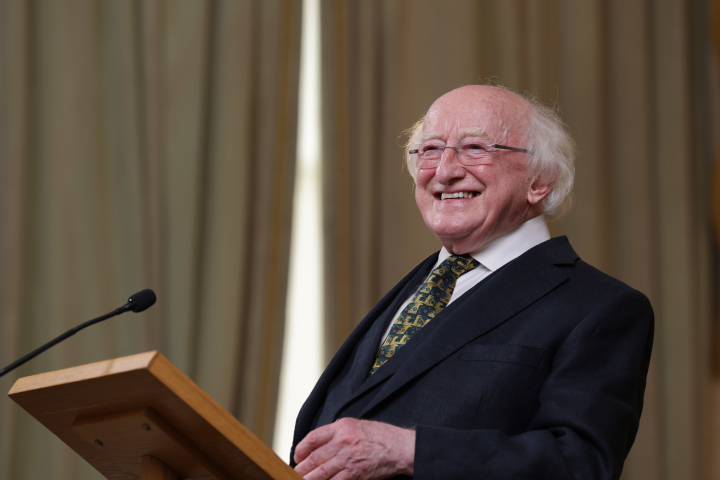
A Message from ICGBV Patron, Uachtarán na hÉireann, Michael D. Higgins
In honour of the ICGBV’s annual webinar, featuring the launch of our new research, “From Survivor-Centred to Survivor-Led: Lessons from Survivor-Led GBV Accountability Initiatives”, President Michael D. Higgins issued this message, as Patron of the ICGBV.
In the message, President Higgins stresses the importance of survivor leadership and calls for sustained commitment and positive actions towards ending GBV.
